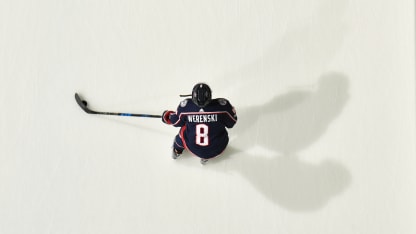"There's a lot of gray areas [with being a 'rover'], in terms of when to jump, when to go, when to pull back, how far to go or when you just have to play defense," Werenski said. "We've been talking about it, of late. I'm trying to get back to it, but it's such a tight playoff race that I don't want to give up anything defensively."
It's a tricky balancing act, for Werenski and all of the Blue Jackets' puck-moving defensemen.
On the one hand, Columbus is playing its best when the back end is indistinguishable from the forwards within the offensive zone. One the other hand, should even one of those forwards forget to cover for a pinching defenseman, the results could be ugly.
That debate is being hashed out in Werenski's mind right now.
"That's when we're at our best, is when we are taking chances and being aggressive, and just playing that aggressive style," said Werenski, whose 11 goals are one away from tying the franchise record for a defenseman in a single season. "But it's a playoff race right now, and no one wants to be the guy that's at fault for giving up chances."
Prior to the game against the Devils on Tuesday, Tortorella again reiterated that he wants Werenski thinking predominantly offense. He gave a specific example, too, from the Blue Jackets' 5-2 loss to the Pittsburgh Penguins on Sunday at Nationwide Arena.
Werenski got the puck off a turnover just inside the Blue Jackets' blue line, and his next decision immediately caught Tortorella's attention. Werenski skated the puck back behind the Columbus net, regrouping for a breakout play, rather than just turning up the ice and skating hard toward the Penguins' end of the rink.
"In that split second, he goes back behind his net," Tortorella said. "[He] makes that decision, all five of their guys are inside the red line and they have that [neutral zone] clogged. His instinct is usually to turn it up and go. Bring someone to you, make a play, jump by him and let's get going. That's where 'Z's got to get back to."
Having more success doing it is the key.
Werenski's assist in New Jersey came off his wrist shot from the low slot, after he sent the puck off the right post. It landed in the crease, where Boone Jenner poked it home for a 1-0 lead just 5:19 into the game. Werenski had another shot in that period, as well, taken from nearly the same spot on the ice - a spot that forwards, not defensemen, usually frequent.
"I think if we're on the attack and we're being aggressive, and making plays, we're going to get some confidence that way and we're going to score more goals than we give up chances," Werenski said. "So, I think we have to get back to that. Our coaches are hounding on us to do that, so I think as this playoff race keeps moving forward, we're going to get some more confidence to do that."

















